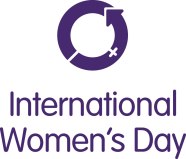 Today is International Women’s Day (IWD), a global day celebrating the social, economic, cultural, and political achievements of women. Since the early 1900s, this day has been a powerful platform that unifies tenacity and drives action for gender parity globally. IWD organizers are calling on supporters to help forge a better-working and more gender-inclusive world. In honor of this year’s International Women’s Day, we are pleased to share these recent books and journals from Duke University Press that support this year’s IWD theme: #BeBoldForChange.
Today is International Women’s Day (IWD), a global day celebrating the social, economic, cultural, and political achievements of women. Since the early 1900s, this day has been a powerful platform that unifies tenacity and drives action for gender parity globally. IWD organizers are calling on supporters to help forge a better-working and more gender-inclusive world. In honor of this year’s International Women’s Day, we are pleased to share these recent books and journals from Duke University Press that support this year’s IWD theme: #BeBoldForChange.
Trans/Feminisms
a special issue of TSQ: Transgender Studies Quarterly
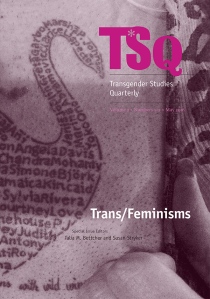 This special double issue of TSQ goes beyond the simplistic dichotomy between an exclusionary transphobic feminism and an inclusive trans-affirming feminism. Exploring the ways in which trans issues are addressed within feminist and women’s organizations and social movements around the world, contributors ask how trans, genderqueer, and nonbinary issues are related to feminist movements today, what kind of work is currently undertaken in the name of trans/feminism, what new paradigms and visions are emerging, and what questions still need to be taken up. Central to this special issue is the recognition that trans/feminist politics cannot restrict itself to the domain of gender alone.
This special double issue of TSQ goes beyond the simplistic dichotomy between an exclusionary transphobic feminism and an inclusive trans-affirming feminism. Exploring the ways in which trans issues are addressed within feminist and women’s organizations and social movements around the world, contributors ask how trans, genderqueer, and nonbinary issues are related to feminist movements today, what kind of work is currently undertaken in the name of trans/feminism, what new paradigms and visions are emerging, and what questions still need to be taken up. Central to this special issue is the recognition that trans/feminist politics cannot restrict itself to the domain of gender alone.
This issue features numerous shorter works that represent the diversity of trans/feminist practices and problematics and, in addition to original research articles, includes theory, reports, manifestos, opinion pieces, reviews, and creative/artistic productions, as well as republished key documents of trans/feminist history and international scholarship.
Living a Feminist Life
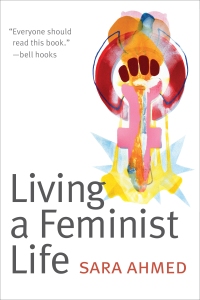 In Living a Feminist Life Sara Ahmed shows how feminist theory is generated from everyday life and the ordinary experiences of being a feminist at home and at work. Building on legacies of feminist of color scholarship in particular, Ahmed offers a poetic and personal meditation on how feminists become estranged from worlds they critique—often by naming and calling attention to problems—and how feminists learn about worlds from their efforts to transform them. Ahmed also provides her most sustained commentary on the figure of the feminist killjoy introduced in her earlier work while showing how feminists create inventive solutions—such as forming support systems—to survive the shattering experiences of facing the walls of racism and sexism. The killjoy survival kit and killjoy manifesto, with which the book concludes, supply practical tools for how to live a feminist life, thereby strengthening the ties between the inventive creation of feminist theory and living a life that sustains it.
In Living a Feminist Life Sara Ahmed shows how feminist theory is generated from everyday life and the ordinary experiences of being a feminist at home and at work. Building on legacies of feminist of color scholarship in particular, Ahmed offers a poetic and personal meditation on how feminists become estranged from worlds they critique—often by naming and calling attention to problems—and how feminists learn about worlds from their efforts to transform them. Ahmed also provides her most sustained commentary on the figure of the feminist killjoy introduced in her earlier work while showing how feminists create inventive solutions—such as forming support systems—to survive the shattering experiences of facing the walls of racism and sexism. The killjoy survival kit and killjoy manifesto, with which the book concludes, supply practical tools for how to live a feminist life, thereby strengthening the ties between the inventive creation of feminist theory and living a life that sustains it.
1970s Feminisms
a special issue of South Atlantic Quarterly
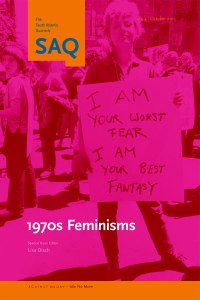 For more than a decade, feminist historians and historiographers have engaged in challenging the “third wave” portrait of 1970s feminism as essentialist, white, middle-class, uninterested in racism, and theoretically naive. This task has involved setting the record straight about women’s liberation by interrogating how that image took hold in the public imagination and among academic feminists. This issue invites feminist theorists to return to women’s liberation—to the texts, genres, and cultural productions to which the movement gave rise—for a more nuanced look at its conceptual and political consequences. The essays in this issue explore such topics as the ambivalent legacies of women’s liberation; the production of feminist subjectivity in mass culture and abortion documentaries; the political effects of archiving Chicana feminism; and conceptual and generic innovations in the work of Gayle Rubin, Christine Delphy, and Shulamith Firestone.
For more than a decade, feminist historians and historiographers have engaged in challenging the “third wave” portrait of 1970s feminism as essentialist, white, middle-class, uninterested in racism, and theoretically naive. This task has involved setting the record straight about women’s liberation by interrogating how that image took hold in the public imagination and among academic feminists. This issue invites feminist theorists to return to women’s liberation—to the texts, genres, and cultural productions to which the movement gave rise—for a more nuanced look at its conceptual and political consequences. The essays in this issue explore such topics as the ambivalent legacies of women’s liberation; the production of feminist subjectivity in mass culture and abortion documentaries; the political effects of archiving Chicana feminism; and conceptual and generic innovations in the work of Gayle Rubin, Christine Delphy, and Shulamith Firestone.
The Revolution Has Come: Black Power, Gender, and the Black Panther Party in Oakland
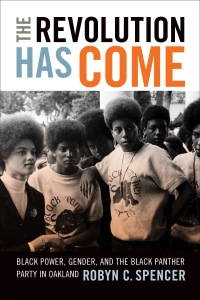 In The Revolution Has Come Robyn C. Spencer traces the Black Panther Party’s organizational evolution in Oakland, California, where hundreds of young people came to political awareness and journeyed to adulthood as members. Challenging the belief that the Panthers were a projection of the leadership, Spencer draws on interviews with rank-and-file members, FBI files, and archival materials to examine the impact the organization’s internal politics and COINTELPRO’s political repression had on its evolution and dissolution. She shows how the Panthers’ members interpreted, implemented, and influenced party ideology and programs; initiated dialogues about gender politics; highlighted ambiguities in the Panthers’ armed stance; and criticized organizational priorities. Spencer also centers gender politics and the experiences of women and their contributions to the Panthers and the Black Power movement as a whole. Providing a panoramic view of the party’s organization over its sixteen-year history, The Revolution Has Come shows how the Black Panthers embodied Black Power through the party’s international activism, interracial alliances, commitment to address state violence, and desire to foster self-determination in Oakland’s black communities.
In The Revolution Has Come Robyn C. Spencer traces the Black Panther Party’s organizational evolution in Oakland, California, where hundreds of young people came to political awareness and journeyed to adulthood as members. Challenging the belief that the Panthers were a projection of the leadership, Spencer draws on interviews with rank-and-file members, FBI files, and archival materials to examine the impact the organization’s internal politics and COINTELPRO’s political repression had on its evolution and dissolution. She shows how the Panthers’ members interpreted, implemented, and influenced party ideology and programs; initiated dialogues about gender politics; highlighted ambiguities in the Panthers’ armed stance; and criticized organizational priorities. Spencer also centers gender politics and the experiences of women and their contributions to the Panthers and the Black Power movement as a whole. Providing a panoramic view of the party’s organization over its sixteen-year history, The Revolution Has Come shows how the Black Panthers embodied Black Power through the party’s international activism, interracial alliances, commitment to address state violence, and desire to foster self-determination in Oakland’s black communities.
Reconsidering Gender, Violence, and the State
a special issue of Radical History Review
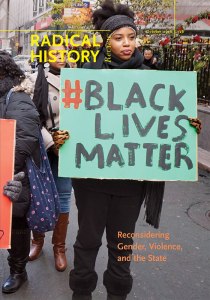 In bringing together a geographically and temporally broad range of interdisciplinary historical scholarship, this issue of Radical History Review offers an expansive examination of gender, violence, and the state. Through analyses of New York penitentiaries, anarchists in early twentieth-century Japan, and militarism in the 1990s, contributors reconsider how historical conceptions of masculinity and femininity inform the persistence of and punishments for gendered violence. The contributors to a section on violence and activism challenge the efficacy of state solutions to gendered violence in a contemporary US context, highlighting alternatives posited by radical feminist and queer activists. In five case studies drawn from South Africa, India, Ireland, East Asia, and Nigeria, contributors analyze the archive’s role in shaping current attitudes toward gender, violence, and the state, as well as its lasting imprint on future quests for restitution or reconciliation. This issue also features a visual essay on the “false positives” killings in Colombia and an exploration of Zanale Muholi’s postapartheid activist photography.
In bringing together a geographically and temporally broad range of interdisciplinary historical scholarship, this issue of Radical History Review offers an expansive examination of gender, violence, and the state. Through analyses of New York penitentiaries, anarchists in early twentieth-century Japan, and militarism in the 1990s, contributors reconsider how historical conceptions of masculinity and femininity inform the persistence of and punishments for gendered violence. The contributors to a section on violence and activism challenge the efficacy of state solutions to gendered violence in a contemporary US context, highlighting alternatives posited by radical feminist and queer activists. In five case studies drawn from South Africa, India, Ireland, East Asia, and Nigeria, contributors analyze the archive’s role in shaping current attitudes toward gender, violence, and the state, as well as its lasting imprint on future quests for restitution or reconciliation. This issue also features a visual essay on the “false positives” killings in Colombia and an exploration of Zanale Muholi’s postapartheid activist photography.
Color of Violence: The INCITE! Anthology
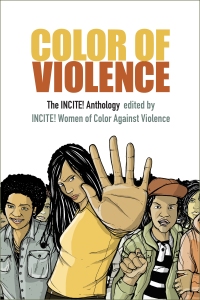 The editors and contributors to Color of Violence ask: What would it take to end violence against women of color? Presenting the fierce and vital writing of INCITE!’s organizers, lawyers, scholars, poets, and policy makers, Color of Violence radically repositions the antiviolence movement by putting women of color at its center. The contributors shift the focus from domestic violence and sexual assault and map innovative strategies of movement building and resistance used by women of color around the world. The volume’s thirty pieces—which include poems, short essays, position papers, letters, and personal reflections—cover violence against women of color in its myriad forms, manifestations, and settings, while identifying the links between gender, militarism, reproductive and economic violence, prisons and policing, colonialism, and war. At a time of heightened state surveillance and repression of people of color, Color of Violence is an essential intervention.
The editors and contributors to Color of Violence ask: What would it take to end violence against women of color? Presenting the fierce and vital writing of INCITE!’s organizers, lawyers, scholars, poets, and policy makers, Color of Violence radically repositions the antiviolence movement by putting women of color at its center. The contributors shift the focus from domestic violence and sexual assault and map innovative strategies of movement building and resistance used by women of color around the world. The volume’s thirty pieces—which include poems, short essays, position papers, letters, and personal reflections—cover violence against women of color in its myriad forms, manifestations, and settings, while identifying the links between gender, militarism, reproductive and economic violence, prisons and policing, colonialism, and war. At a time of heightened state surveillance and repression of people of color, Color of Violence is an essential intervention.
World Policy Interrupted
a special issue of World Policy Journal
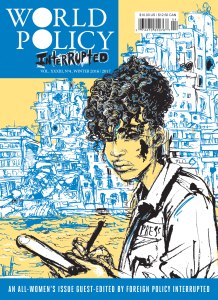 This issue is penned entirely by female foreign policy experts and journalists and “imagines a world where we wouldn’t need to interpret to be heard at the table. In reconstructing a media landscape where the majority of foreign policy experts quoted, bylined, and miked are not men, we quickly gain deeper insight into a complex world, one historically narrated by only one segment of society,” co-editors Elmira Bayrasli and Lauren Bohn write. Bayrasli and Bohn lead Foreign Policy Interrupted, a program that mentors, develops, and amplifies the voices of women in the international policy field. Foreign Policy Interrupted combats the industry’s gender disparity through a visibility platform and a cohesive fellowship program, including media training and meaningful mentoring at partnering media institutions. The program helps women break both internal and external barriers.
This issue is penned entirely by female foreign policy experts and journalists and “imagines a world where we wouldn’t need to interpret to be heard at the table. In reconstructing a media landscape where the majority of foreign policy experts quoted, bylined, and miked are not men, we quickly gain deeper insight into a complex world, one historically narrated by only one segment of society,” co-editors Elmira Bayrasli and Lauren Bohn write. Bayrasli and Bohn lead Foreign Policy Interrupted, a program that mentors, develops, and amplifies the voices of women in the international policy field. Foreign Policy Interrupted combats the industry’s gender disparity through a visibility platform and a cohesive fellowship program, including media training and meaningful mentoring at partnering media institutions. The program helps women break both internal and external barriers.
Stay up to date on women’s studies scholarship with these journals on gender studies, feminist theory, queer theory, and gay and lesbian studies:
Camera Obscura
differences
GLQ: A Journal of Lesbian and Gay Studies
Journal of Middle East Women’s Studies

Helpful post for 2017 women’s day you share here..Please stay informed like this…Thnx man
LikeLike
Great information, like this… Thank
LikeLike
inspiration
LikeLike
Wow, Nice Iformation
LikeLike
Thanks for sharing
LikeLike
Thanks For Sharing
LikeLike